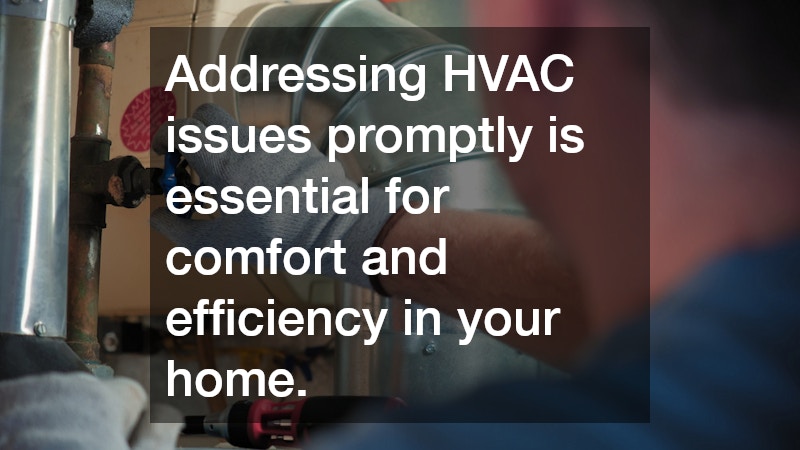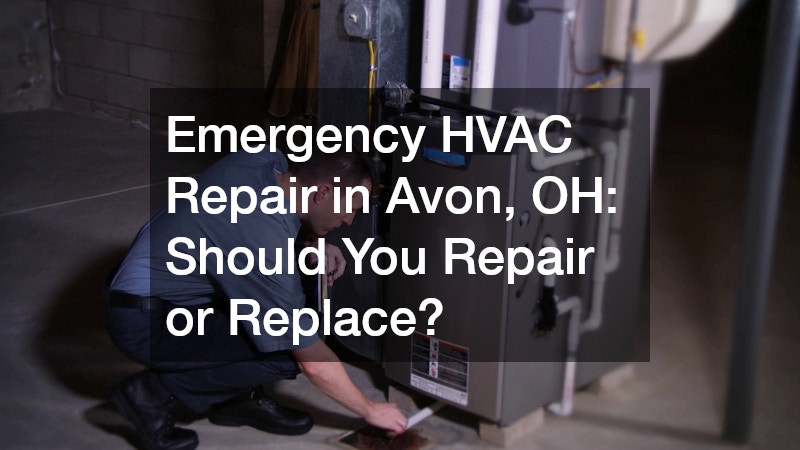
Addressing HVAC issues promptly is essential for comfort and efficiency in your home. When systems fail, homeowners must decide between repairing and replacing their HVAC unit. Factors influencing this decision include the system’s age, performance, and repair costs. Westland HVAC + Plumbing specializes in emergency HVAC repair in Avon, OH, and can help you identify signs that indicate when immediate repairs or an upgrade is the best solution.
What Are the Signs That Indicate Your HVAC System Needs Emergency Repairs?
Unusual Noises and Leaks
Unusual noises from your HVAC system, such as banging or hissing, often indicate trouble. These sounds can signal loose components or refrigerant leaks, which, if ignored, may lead to more significant issues.
Similarly, leaks around your furnace or air conditioner should not be overlooked, as they can cause mold growth or structural damage. Addressing these problems promptly with professional help is crucial to avoid costly repairs and system breakdowns, especially during extreme weather. Regular maintenance can help catch these issues early, ensuring your HVAC system operates efficiently and effectively throughout its lifespan.
Inconsistent Temperatures
HVAC systems are designed to maintain consistent indoor temperatures, and deviations may indicate the need for repairs. Rooms that are significantly warmer or cooler than others can signal issues with ductwork or the thermostat. Addressing these discrepancies promptly ensures comfort and energy efficiency. Additionally, temperature inconsistencies can arise from airflow problems due to blocked or damaged ductwork, leading to hot or cold spots in your home. Checking for thermostat malfunctions is also important; incorrect settings can create widespread temperature variations. Regularly ensuring that your thermostat is calibrated and functioning properly helps maintain even indoor temperatures effectively.
A Rising Energy Bill
A sudden spike in your energy bill is often an indicator of an inefficient HVAC system. Systems that work harder than necessary to regulate indoor temperatures typically consume more energy, leading to higher costs. Regular maintenance is crucial to keeping the system efficient and your energy bills manageable.
Inefficiencies can often stem from worn-out parts or outdated components that aren’t in sync with the rest of the system. Addressing these issues with necessary repairs or upgrades can improve system efficiency and reduce operational costs.
Monitoring energy usage over time can help you identify when your HVAC system starts to decline in performance. Investing in energy-efficient upgrades, like programmable thermostats or modern air filters, can enhance system performance and lower bills, thus saving money in the long run.
When Is It More Cost-Effective to Replace Rather Than Repair?
Age of the HVAC System
As HVAC systems age, their efficiency and reliability often decline. Most systems have a lifespan of 10-15 years, after which they become more prone to breakdowns and inefficiencies. Older systems can also struggle to meet energy standards, leading to higher operational costs.
Investing in a new system can offer significant benefits, including improved energy efficiency, enhanced comfort, and advanced technological features. A modern system often comes with better warranties and can provide a significant return on investment through reduced energy bills.
Additionally, considering the age of your HVAC system can help you plan replacement costs before a complete failure occurs. Proactively upgrading can prevent unexpected expenses during a system breakdown and eliminate the need for emergency replacements.
Frequency and Cost of Past Repairs
If your HVAC system requires frequent repairs, it might be more cost-effective to consider replacing it. Repeated service calls can quickly add up, sometimes exceeding the cost of a new system. It’s important to weigh the cumulative repair costs against the price of a new unit.
Moreover, frequent breakdowns disrupt the comfort and reliability of your home’s climate control. A new system offers peace of mind with fewer service interruptions and potential cost savings due to improved efficiency and reliability.
When evaluating repair versus replacement, consider how often you’ve had to call in HVAC professionals for repairs. If issues recur frequently despite repairs, investing in a new, reliable system may be the most practical long-term solution.
Energy Efficiency and Advanced Technology
Technological advancements in HVAC systems have led to remarkable improvements in energy efficiency. Newer models often include features such as variable-speed motors and smart thermostats, contributing to a more environmentally friendly and cost-effective system.
Energy-efficient systems not only reduce utility bills but also minimize your carbon footprint. Incentives such as tax credits or rebates for energy-efficient upgrades might be available, further supporting the financial benefits of replacing an outdated unit.
Furthermore, modern HVAC systems offer additional conveniences, like remote control and monitoring through smart technology. These features provide improved comfort management and operational insights, allowing homeowners to optimize their system’s performance and save on energy costs.
How to Choose the Right HVAC Replacement Options and Services in Avon, OH?
Researching Local HVAC Contractors
Choosing the right contractor is vital to ensuring a smooth HVAC replacement process. Begin by researching local HVAC companies in Avon, OH, and comparing their services. Look for contractors with good reputations, positive reviews, and proper licensing and certifications, as these are indicators of quality service.
Asking for recommendations from neighbors or friends who recently replaced their HVAC systems can provide firsthand insights. Additionally, consult online platforms where past customers share their experiences and overall satisfaction with contractor services.
Obtaining multiple quotes from different contractors can also help you make a well-informed decision. Remember to inquire about warranties, installation timeframes, and after-sales service support, as these factors contribute to your overall satisfaction with the replacement process.
Understanding SEER Ratings and New Technologies
Seasonal Energy Efficiency Ratio (SEER) ratings are crucial when selecting a new HVAC system. Higher SEER ratings indicate greater energy efficiency, which translates to lower operating costs over time. It’s beneficial to understand these ratings and choose a system that meets or exceeds current energy standards.
Additionally, familiarizing yourself with the latest HVAC technologies can help you select the best system for your needs. Features such as multi-stage compressors, variable speed fans, and smart thermostats offer improved performance and convenience.
Discuss these options with your HVAC contractor to find a system that aligns with your budget and comfort preferences. Prioritizing energy efficiency and advanced technology can ensure long-term satisfaction with your new HVAC system.
Evaluating Warranties and Service Plans
Warranties and service plans are essential considerations when replacing your HVAC system. A comprehensive warranty can protect your investment and offer peace of mind by covering potential repair costs. Compare the warranties offered by different manufacturers and select one that provides the best coverage.
Service plans often include regular maintenance checks and priority service, ensuring your HVAC system consistently operates at its best. Investing in a service plan can prevent future problems and extend the lifespan of your new system.
Review the terms and conditions of warranties and service plans carefully. Understanding the extent of coverage, any exclusions, and the process for making claims ensures you’re fully informed and prepared for any future issues.
Conclusion
Deciding whether to repair or replace your HVAC system hinges on various factors, from the system’s age and efficiency to the frequency and cost of repairs. By identifying early signs of deterioration and comparing the advantages of modern systems, you can make a well-informed decision that aligns with your financial and comfort needs. For homeowners in Avon, OH, prioritizing research into local contractors and understanding technological advancements can ensure a seamless transition and long-term satisfaction with your HVAC system.



